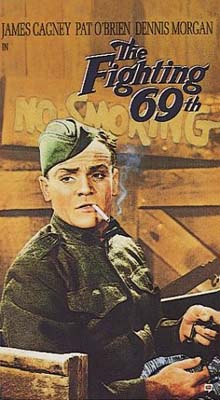The Fighting 69th
| The Fighting 69th | |
|---|---|
 VHS cover | |
| Directed by | William Keighley |
| Written by | Norman Reilly Raine Fred Niblo, Jr. Dean Riesner |
| Produced by | Louis F. Edelman Hal B. Wallis |
| Starring | James Cagney Pat O'Brien George Brent Dennis Morgan Alan Hale, Sr. |
| Cinematography | Tony Gaudio |
| Edited by | Owen Marks |
| Music by | Adolph Deutsch |
| Color process | Black and white |
Production company | Warner Bros. |
| Distributed by | Warner Bros. |
Release date |
|
Running time | 90 minutes |
| Country | United States |
| Language | English |
| Box office | $2,313,000[1] |
The Fighting 69th is a 1940 American war film starring James Cagney, Pat O'Brien, and George Brent. The plot is based upon the actual exploits of New York City's 69th Infantry Regiment during World War I. The regiment was given that nickname when opposing General Robert E. Lee during the American Civil War.
Real people portrayed in The Fighting 69th include Father Francis P. Duffy, the chaplain; battalion commander and future OSS leader "Wild Bill" Donovan; Lt. Oliver Ames, a platoon commander; and then-Sgt. Joyce Kilmer (Jeffrey Lynn), a famous poet, who was killed in battle on July 30, 1918.[2]
Most of The Fighting 69th was filmed at Warner Brothers' Calabasas Ranch location, which served as Camp Mills, the regiment's training base, various French villages, and numerous battlefields.[3]
Plot
[edit]The plot centers on misfit Jerry Plunkett (James Cagney), a tough-talking New Yorker who displays a mixture of bravado and disrespect for officers. Caught up in patriotic fervor when the United States enters WWI, he joins the 69th with aim of winning medals by singlehandedly defeating the Germans.
However, Plunkett's inexperience and disrespect for command lead to him making errors in battle and eventually show him to be a coward. The chaplain, Father Francis P. Duffy (Pat O'Brien) believes there to be something more in the young man and begs the 69th's commanding officer Major "Wild Bill" Donovan (George Brent) to give Plunkett one more chance. Donovan reluctantly agrees and when the 69th is ordered to send a squad into no man's land to capture German soldiers for intel, Donovan orders Plunkett to join them.
Plunkett's inexperience and nervousness lead to him accidentally disclosing the squad's position and leads to the deaths of two well respected soldiers Lieutenant "Long John" Wynn (Dick Foran) and Private Timothy "Timmy" Wynn (William Lundigan). Donovan is outraged and ultimately orders Plunkett to be court-martialed. However, while he is awaiting execution, Fr Duffy approaches Plunkett in one last attempt to save him spiritually. Plunkett begs the priest to release him so he can desert the army and escape the war. Fr Duffy declines his request and when his jail cell is destroyed by a German shell and he is freed, Plunkett witnesses Father Duffy ministering to several wounded troops, urging them to keep their faith and have courage.
Shamed and inspired by Donovan's forbearance and courage, Plunkett decides to rejoin his unit at the front and support their advance. However, when he catches up with the 69th he spots that the battalion has been stopped by a fierce German bombardment. Coming across a mortar whose crew have almost all been killed, he finds Sgt. "Big Mike" Wynn and implores the older man to tell him how to operate the mortar. Sgt. Wynn initially refuses as he recalls how Plunkett had caused the death of his two brothers in an earlier encounter with the enemy.
Plunkett though perseveres and starts to use the mortar to counter the German bombardment and allow the 69th to push ahead with the advance. The Germans though counter and throw a grenade into the trench where Plunkett and Sgt. Wynn are. In one desperate act of heroism he sacrifices his life by diving on the grenade in a bid to protect "Big Mike". Plunkett is mortally wounded and succumbs to his wounds leaving Major Donovan and Sgt Wynn in shock at the young man's true bravery.
While Jerry Plunkett was a fictional character, Father Duffy, Major Donovan, Lt. Ames, and poet Joyce Kilmer were all real members of the 69th. Many of the events depicted (training at Camp Mills, the Mud March, dugout collapse at Rouge Bouquet, crossing the Ourcq River, Victory Parade, etc.) actually happened.
Cast
[edit]
|
|
Production
[edit]John T. Prout, an Irish American who was a former Captain in the regiment and a general in the Irish Army, was the movie's "technical advisor".[4][5]
Priscilla Lane was initially cast as one of the soldiers' girls back home, but the part was cut prior to production. No female characters are seen in the film.

Reception
[edit]According to Warner Bros. records, the film made $1,822,000 domestically and $491,000 foreign, for a worldwide total of $2,313,000.[1]
References
[edit]- Notes
- ^ a b Warner Bros financial information in The William Schaefer Ledger. See Appendix 1, Historical Journal of Film, Radio and Television, (1995) 15:sup1, 1-31 p 20 DOI: 10.1080/01439689508604551
- ^ Werner, Stephen. "The tragedy of Joyce Kilmer, the Catholic poet killed in World War I." America, 219, No. 2 (July 27, 2018).
- ^ The Fighting 69th at TCM.com
- ^ IMDb "Full Credits"
- ^ Gevinson, Alan American Film Institute Catalog


 French
French Deutsch
Deutsch